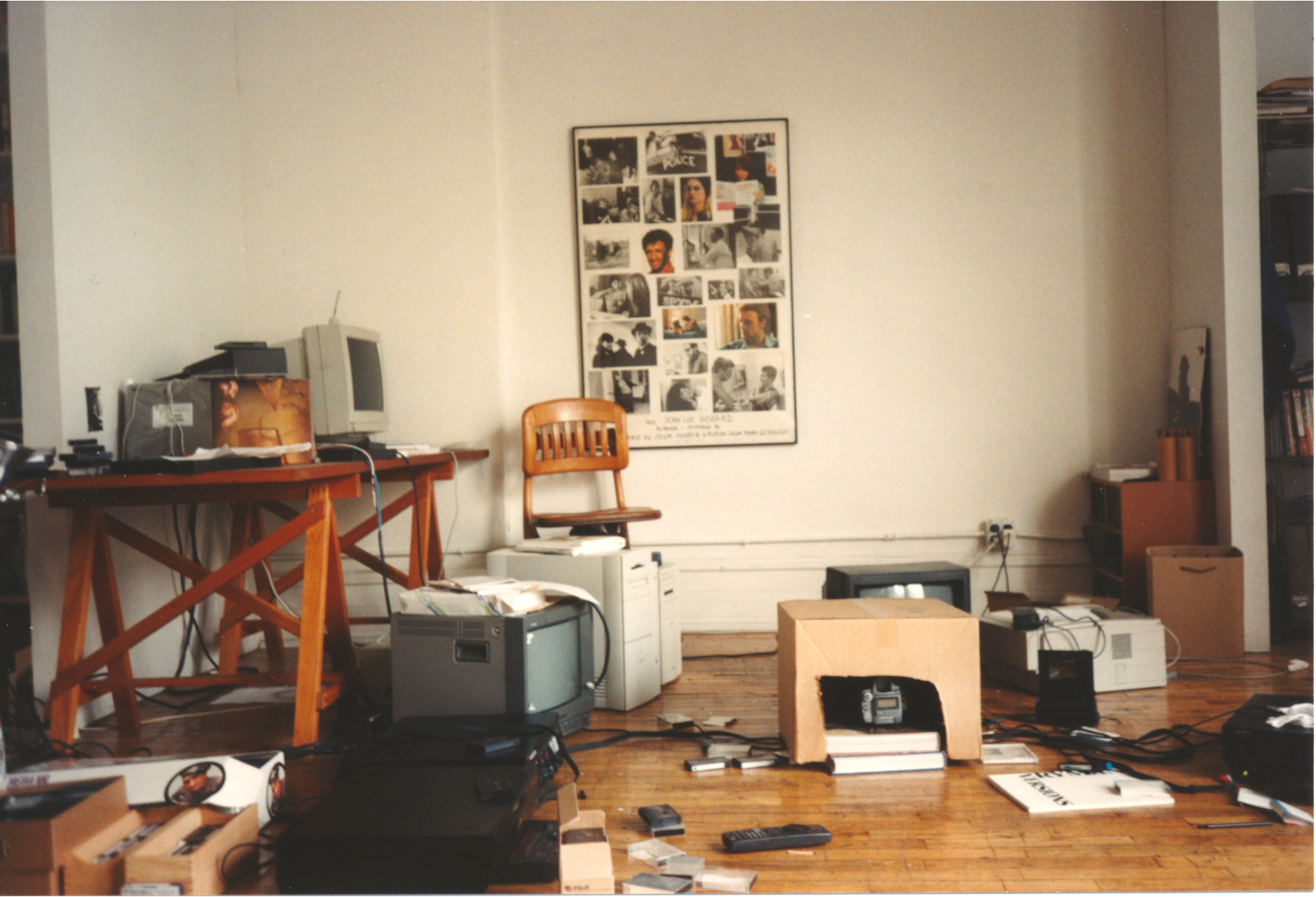
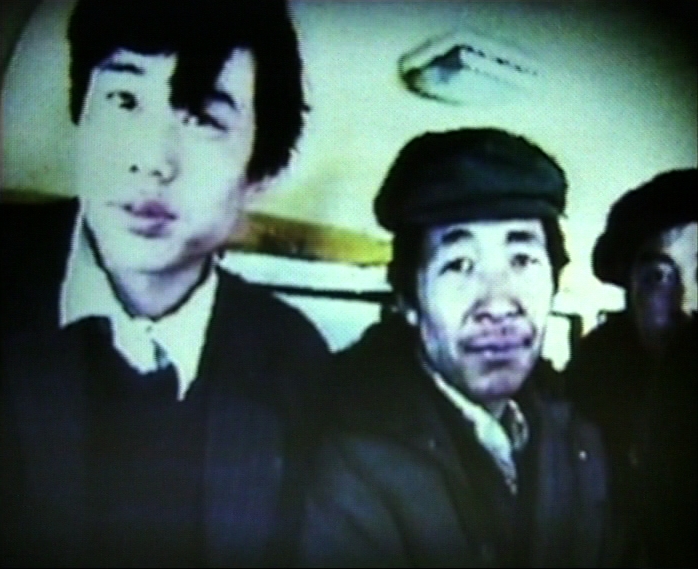
THE LOST DAYS
Synopsis
In 1996, I wrote a story about a young woman, who travelled around the world sending back video letters to a friend in New York. That year, I contacted fifteen people in different cities (Marrakesh, Jaffa, Lisbon, Milan, Paris, Moscow, Beijing, Hong Kong, Taipei…) I asked them to videotape their countries, as if they were her. Out of the tapes that they sent me, I made The Lost Days.
Laura Waddington, 1999
Director’s Statement
I wanted to make a film about a young woman who travelled around the world, filming the things that she saw. In my mind, this young woman didn’t really belong anywhere and her travels, instead of bringing her closer to who she was, would push her further away. She reminded me of a sentence that I had once read, “I miss the world…I feel homesick for each and every country.”
At the time I began to think about this woman, I was living illegally in the States and could not travel. Everyday I was thinking of her and how much I wanted to tell her story. Gradually, I came up with the idea of having other people shoot my film for me.
I started to search for people who I believed could fit into my character’s mind. I wanted them to really live her journey, filming their cities through her eyes and wandering the streets as if they were her. Through the internet, friends and organisations, I came up with a list of people in fifteen countries, who I thought sounded interesting.
I began to write to them about my character. I asked them to borrow a Hi8 camera and to film the things that I thought she would be drawn to. For each country, I consulted maps, books, stories and imagined the way she would pass through there. Sometimes I would send lists and specific instructions but most of all I would just talk about a feeling.
Every few weeks, a tape would arrive from someone I had contacted. The year passed like that and every time I got a new tape my conception of the young woman was changed.
At the end of the year, I started to make the story. I spent months filming images off screens, isolating, slowing down, colouring. Slowly the journey started to emerge and one day the story was completely there. There was a beginning in Jaffa and an end in Taipei, lots of driving and a man waiting somewhere in New York. In each of the tapes that people sent there were endless possibilities. The video is just one version of what existed there.

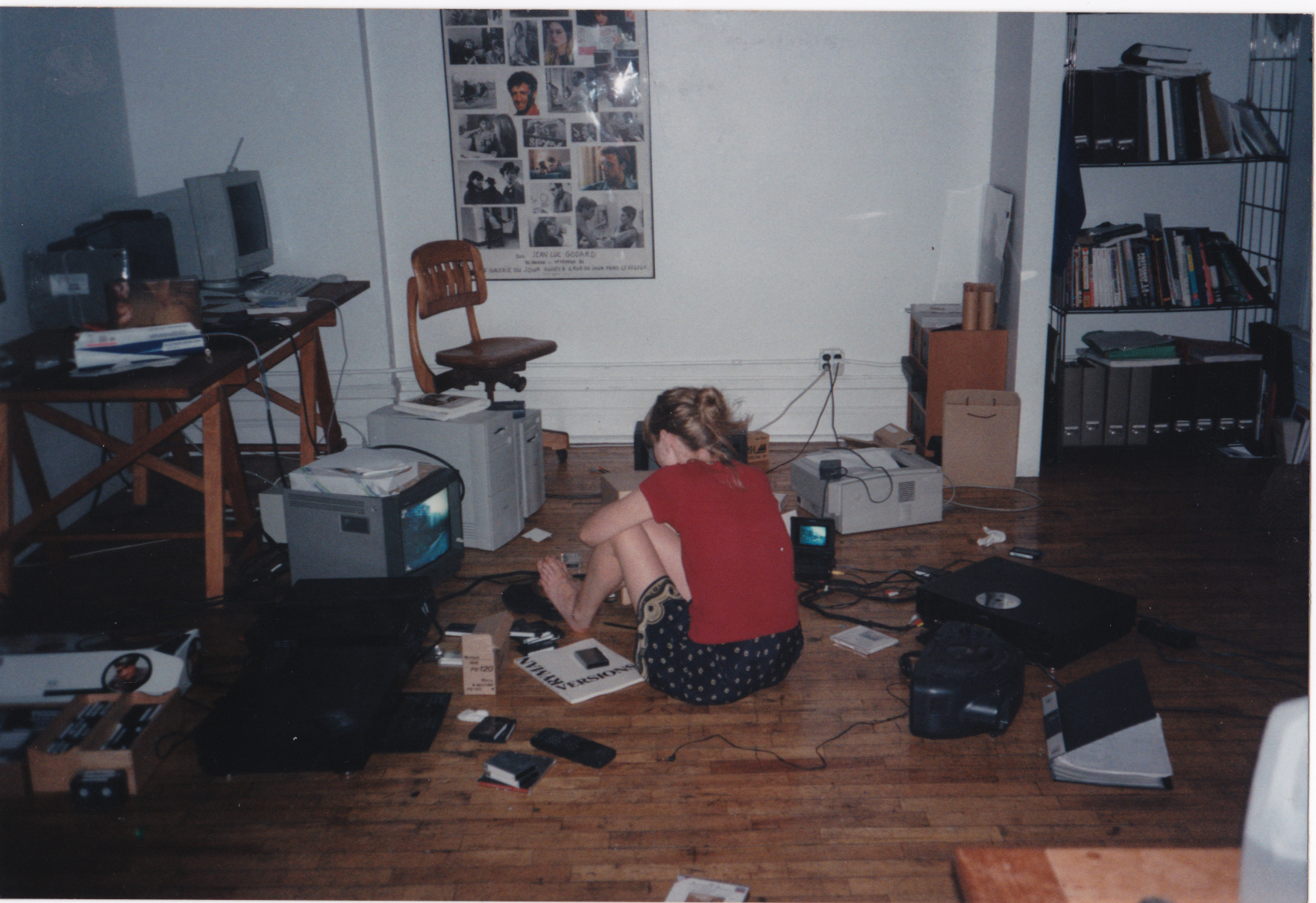
Laura Waddington, 1999
On the making of The Lost Days
I loved cinema. Beamed into the communal space of a dark room, the flicker of celluloid gave us the courage to travel deep into ideas and our unconsciousness. As I zoomed into the footage, isolating and re-framing it on different monitors, I became haunted by the idea of a time when cinema would be un-housed, its images broken up and projected onto screens so small and different, we couldn’t yet imagine them. Once we were alone, isolated in our viewing experiences, would we ever confront what it is to be human in such a profound way again, or live distracted and restless?
Read related passage in Scattered Truth
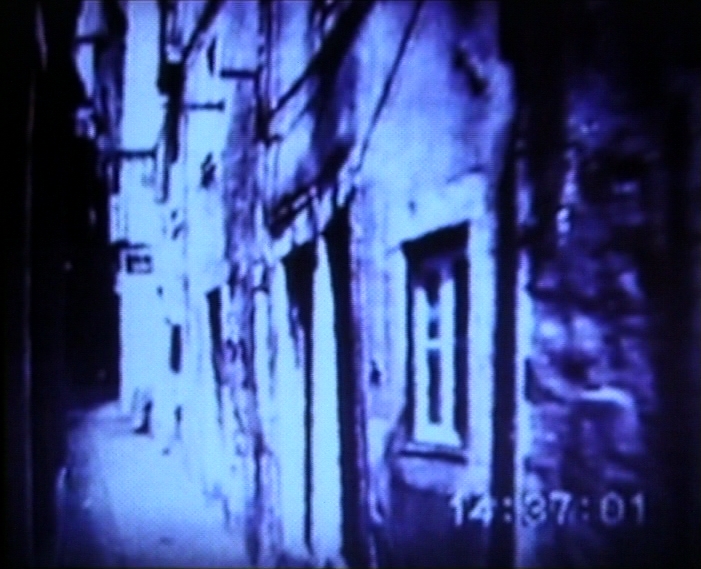
Press Quotes
“One of the rare socially engaged contemporary travellers who upholds the high ethical and aesthetic principles in filmmaking, established by Chris Marker … This intricately woven study of melancholy, alienation, otherness, and difference could easily be paired in a double bill with Marker’s Sans Soleil.”
Jurij Meden, Kinoplus, Ljubljana
Read article: Pesaro 2005 – skakanje na glavo (Slovenian original)
“It is what allows her to make The Lost Days without having filmed a single shot. Here, the aim was to transform images filmed by other people in Europe, Asia and the Arab world into her own images. But aside from a retrospective appropriation—the calling into question of the concept of author—it is once again a way of seeing, of seeing with and through the eyes of other people. To join and mix together multiple points of view alien to one another into a single gaze—a gaze that stretches on a geographical scale towards the transversal. To make of the eye an organ, dedicated to voyage, to perpetual exile, one that ignores frontiers and encircles the world in an endless trajectory.”
Bouchra Khalili, The 51st International Short Film Festival Oberhausen Catalogue, Germany
Read catalogue essay: The Pain of Seeing (English translation)
“The tram appears to float, as it silently moves in slow motion, up the narrow alleys of Lisbon’s old town. The camera, as it peers outside, catches blurred impressions: hurried pedestrians, a street sweeper, old men leaning in doorways. “Sometimes,” says the woman’s voice off-screen, “when I watch the people, a feeling of sadness invades me and I think of all the other lives I could have had.” The Lost Days (1999) is a fictional travel diary by the thirty-two year old British video artist Laura Waddington. The images that unfold here, were not, in fact, recorded by the director but by her friends and acquaintances in fifteen cities using borrowed Hi-8 cameras. This is how The Lost Days becomes a game of perspectives: the images of many synthesised by Waddington’s editing and off-screen commentary into a single perspective, which is paradoxically both highly personal and fictional: “I would love so much to capture it, as it really is here—the sticky heat, the sleepless nights, the darkened interiors where the women sit, passing time—a whole world that doesn’t notice me.”
Maya Mckechneay, Falter, Vienna
Read article: Streifenweise (German original)
“Laura’s and Stephen’s films possess that certain heartwarming quality; in their presence you feel comfortable, as if you have arrived, as if you are at home. It feels like the kind of home that can be anywhere—especially within oneself. The mere knowledge that they exist, these wondrous films, has an effect. You love them, you need them. Like a bite of bread. As different as they are in form, content, and atmosphere—Stephen’s undisguised gaze at his friends’ smiles, even at their pain, and Laura’s diary, for which she asked friends around the globe to film in her place; the shots visually altered and interwoven with poetic language to create a sense of emotional closeness—these two films are, at once, so powerful and comforting that they point to something far beyond themselves: “Somehow not enough, somehow never enough, such beautiful things, such beautiful things.’”
Michael Pilz, Program notes by the director for his retrospective So Much Beauty, Österreichisches Filmmuseum, Vienna
“There’s something deeply erotic to Waddington’s works, particularly since The Lost Days when she stopped – then out of material necessity – to work with images running at normal speed and started to use slowed down moments made more passionate by Simon Fisher Turner’s soundscapes. Travelling becomes one with loving, the drawn-out, hyper-present moments become memories grasped at, the way one commonly tries to elongate the flow, fleeting moments of passion.”
Olaf Möller, 41a Mostra Internazionale del Nuovo Cinema Pesaro Catalogue, Italy
Read catalogue essay: The Days and Years of My Travels (English original)
Read catalogue essay: The Days and Years of My Travels (Italian translation)
“By filming the footage directly off a television screen and distorting it to the point that cities blend together and the images become abstract forms, Waddington reflects the shifting mindset of the traveller: personal memories increasingly overshadow the actual experience, until, in the end, the decision to return home is made. The captivating beauty of the visual compositions in Waddington’s films, accompanied by Fisher Turner’s hypnotic music, is fascinating. Yet it is a beauty that emerges only from a deep intellectual and emotional engagement with the filmed material. Regarding reality, as people typically encounter it, the voice-over in The Lost Days expresses a clear stance, revealing that Waddington is not solely concerned with social critique but fundamentally with reflection and perception itself: “Too much beauty, impossible to film.”
Oliver Rahayel, Film Dienst, Bonn
“This traveling, searching figure, who breaks away from familiar references and ties, ventures into the unknown, engages with the new and unfamiliar to expand her horizons, open up perspectives and test her own limits, reflects an approach that also determines Laura Waddington’s later films. She travels to … encounter the unfamiliar, always looking to experience herself within this otherness and uncertainty.”
Eva Kuhn, Border – ein filmisches Gedenken oder Die videografischen Spuren von Laura Waddington, Universität Basel
“A story told with many cameras; a young woman whom we never see, but whose point of view is captured by fifteen camera operators recruited by English filmmaker Laura Waddington, to film their cities as stages on the journey of a fictional character. Through these fifteen perspectives, The Lost Days transports us from Jaffa to Taipei, passing through Bosnia, Hong Kong, Moscow, and other equally evocative cities. With each new Hi-8 cassette that she received during the year spent making the project, Laura would modify her road story about this wandering girl, lost in time, mediating on the things that she believes to disappearing. Re-filmed off a television screen, slowed down, re-coloured, saturated, these visually synthesised images plunge us into a forty-minute journey that is fabulously sensual, melancholic, poetic…”
Patrick Pearce, Tournages webzine, Montreal
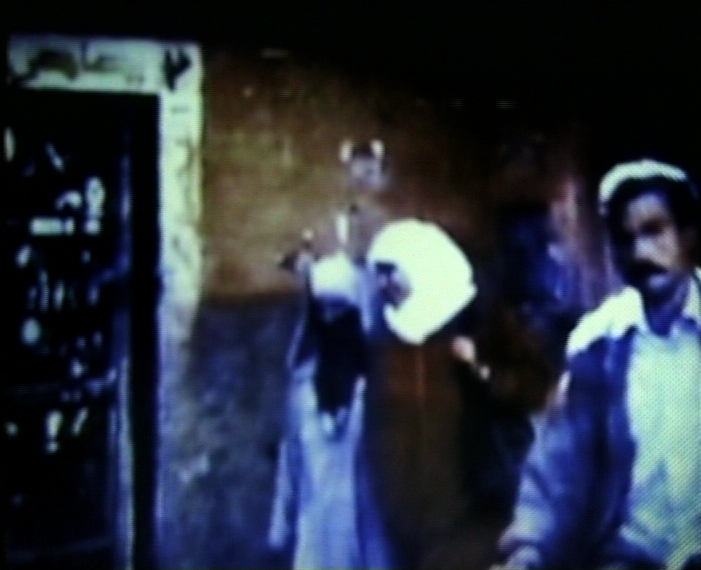
Selected Screenings
- 29th International Film Festival Rotterdam, the Netherlands [world premiere]
- The New York Video Festival 2000, Film Society of Lincoln Center, New York
- 29th Montreal International Festival of New Cinema and New Media (FCMM), Canada
- 18th World Wide Video Festival, Amsterdam, the Netherlands
- Transmediale International Media Arts Festival 2000, Berlin, Germany
- ISEA 2000, 10th International Symposium on Electronic Art, Paris, France
- Cinematexas 2000, Texas, US
- Videomedeja 5, Novi Sad, Serbia
- Filmer à tout prix, 10ème édition, Brussels, Belgium
- Carte Blanche à La Cinémathèque de Tanger, 18e Instants Vidéos numériques et poétiques, Marseille, France
- New Abstract Films, Film Forum, American Cinematheque, Los Angeles, US
- In Person: Laura Waddington, Österreichisches Filmmuseum, Vienna, Austria [curated by Brigitta Burger-Utzer, Sixpack Film]
- Kartographien: Territories, Austrian Filmmakers Coop, 20er Haus [Belvedere 21. Museum of Contemporary Art], Vienna, Austria
- Omaggio a Laura Waddington, 41st Pesaro International Film Festival, Italy
- Special: Laura Waddington, 51st Oberhausen International Short Film Festival, Germany
- Laura Waddington, Mostra Video Itau Cultural, Palácio das Artes, Belo Horizonte, and Instituto de Artes do Pará, Bélem do Pará, Brazil
- The Lost Days / Some Friends (Apart) – Carte Blanche #2 Michael Pilz, Retrospective Michael Pilz: So Much Beauty, Österreichisches Filmmuseum, Vienna, Austria
CollectionS
- BFI, National Film Archive, UK
- BFI, London – Heritage Project 2022, UK
- LUX, London
- Bibliothèque Universitaire de Rennes, France
- Bibliothèque Ecole des Beaux Arts, Avignon, France
- Bibliothèque Ecole des Beaux Arts, Toulouse, France
- Bibliothèque de Strasbourg, France
- Bibliothèque de Luxembourg
- Bibliothèque d’Evry, France
- Mediathèque de Cavaillon, France
- Video Pool Media Arts Centre, Winnipeg, Canada
- CICV Pierre Schaeffer, France
- Heure Exquise ! Centre international pour les arts vidéo, France
Back to top